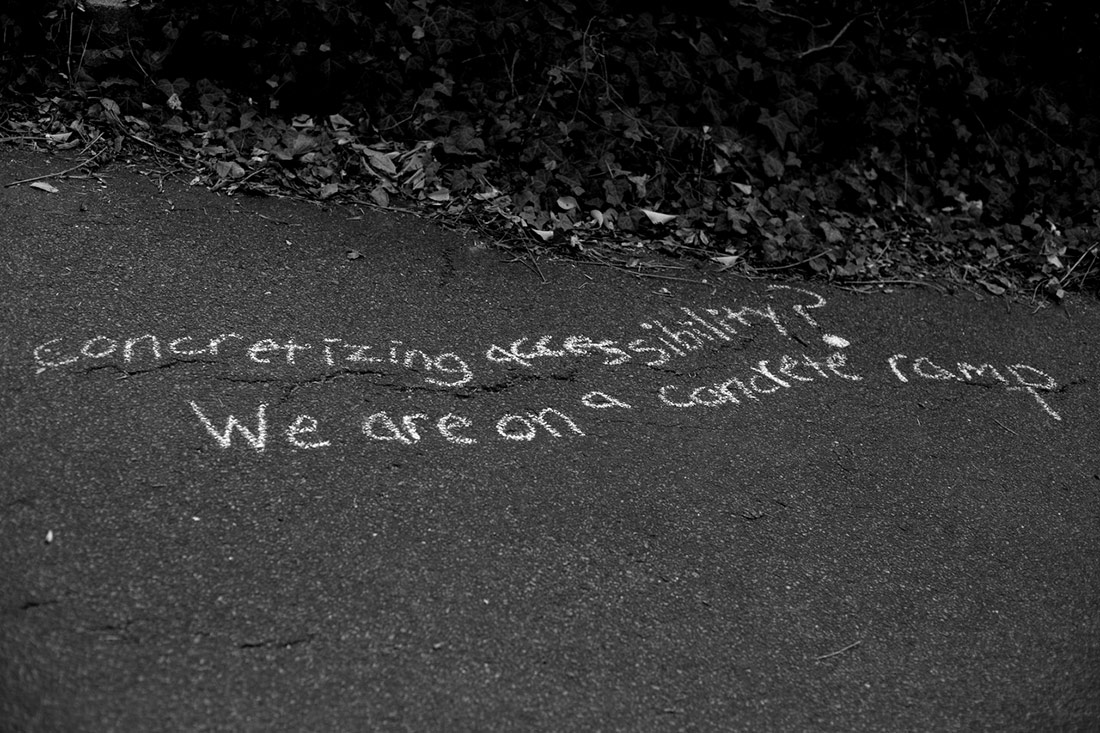
A photo shows writing in green chalk on a concrete outdoor ground. It is from a recent performance from MELT titled ‘Against Curing’ at Floating University in Berlin. The letters move around a crack and read: concretizing accessibility? We are on a concrete ramp.
We are not here to tell you how to make X more accessible. We are not asking for [boxes to be checked] crumbs – we are asking for a culture shift and for long-held assumptions to crumble. We are asking for access, but more than that, we are calling for anti-ableism to be put into practice(s). Anti-ableism unmakes ableism, a form of oppression that hierarchizes people and practices in terms of ability, and is interwoven with racism, anti-queer sentiment, colonial disposession, classism, and other forms of structural oppression.
Anti-ableism is a cultural practice that understands disability as a valuable site of knowing-feeling in the world. Anti-ableism is well resourced to unmake the misconception that one way of being/moving/sensing is better than another. Accessibility is part of this, but we mean more than just that. Accessibility is a question of standards: measures of door widths, guidelines on how to write alt texts for websites and how to formulate texts in simple language. Don’t get us wrong – all of this is important, and absolutely under-resourced and under-cared for, but none of it makes for full equity if the norms that make up ableism do not shift. Ableism essentialises the nondisabled bodymind as the norm and fully human standard, and devalues anyone or anything that does not fit into its rigid regime of capability. Within ableist culture, accessibility is something to be offered for disabled people, to allocate extra budget for, and to hire specialists for. In the ableist imaginary, disabled people are somewhere else, never here, where decisions are made.
On ACCESS SERVER
As artists, we are world building anti-ableist practices through frictional design interventions and artworks like ACCESS SERVER. ACCESS SERVER brings our demands for anti-ableist institutions here, into the inboxes of cultural workers. ACCESS SERVER is an email server that anonymises, collects and financially compensates the access requests sent by disabled people to cultural institutions. This means that any disabled person writing an email to a cultural institution asking for access can do so anonymously through ACCESS SERVER and will be paid €20 for their labour. The project is currently in the prototyping stage.
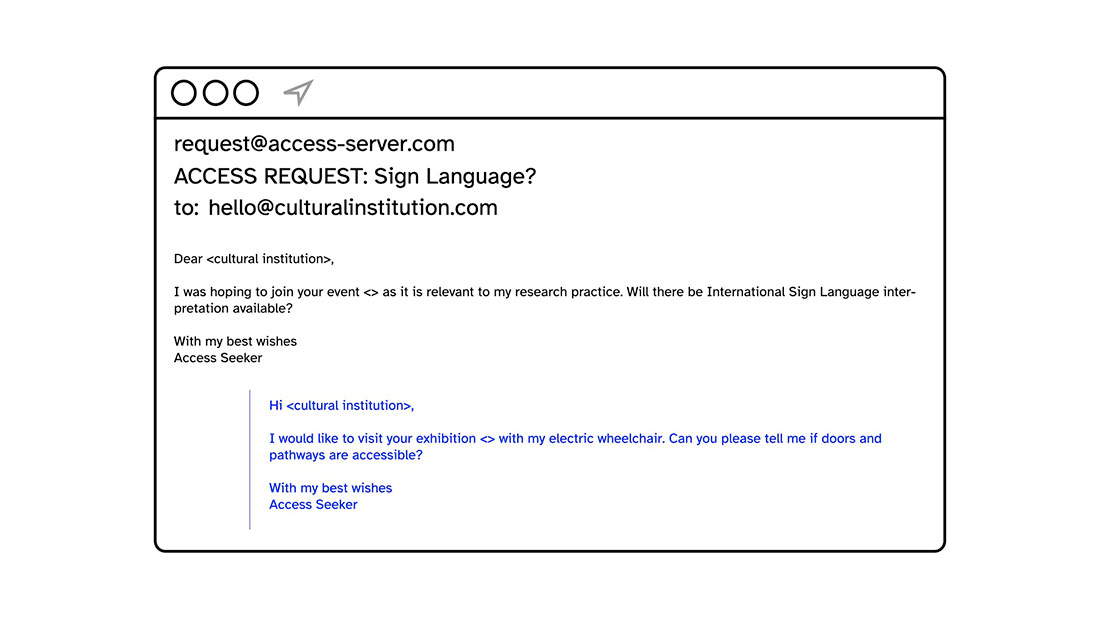
ACCESS SERVER intervenes in multiple sites of unmaking ableism simultaneously. The project upholds, empowers and emboldens disabled people writing to cultural institutions by remunerating them for their efforts. It offers email templates to make drafting emails more accessible. And it links emails to the same institution together so that the people writing can be sure that they are not the only ones asking for access. ACCESS SERVER also works with cultural institutions to grow their access knowledges, sharing resources on how to shift internal practices within institutions and how to make access possible. This means that when cultural workers are greeted with access requests, they are supported in learning how to address the discriminations and inaccessibilities shared.
ACCESS SERVER works with micro-reparations, paying disabled people €20 per email to compensate the labour being done. It values the work of asking for access into spaces that is guaranteed for many nondisabled people. Anonymisation extends this protection; following Sara Ahmed, we recognise the paradigm of “When you point out a problem, you become the problem.” ACCESS SERVER works as a communication interface between institutions and disabled people, so that disabled people are not targeted when asking for something cultural workers are not yet familiar with.
Dear Van Gogh Expo London,
I am aware that you do not use strobe lighting in your expositions, but can you confirm that there isn’t any small, repeating patterns of light either as this can trigger a seizure for photosensitive viewers? If this isn’t the case, can you please update your FAQ’s ‘Access’ page? Thank you for your time.
All my best,
Access Seeker
As a project, ACCESS SERVER works on unlearning ableism across multiple registers: internalised ableism, countering ableism through collective action, and unlearning institutional ableism. This network of unlearning ableism is a bit like unhooking: a net from a frame, a swing from being wrapped up, a curtain from a rail, a ship from an anchor. The action of unhooking releases the weight and allows it to swing down and out. This energy can then be transformed.
ACCESS SERVER supports disabled people in pointing out and challenging inaccessibilities and the status quo of ableism as an empowering act. Access Seekers are agents of unmaking ableism as structural oppression and resist ableist isolation and silence. Through the linking of emails, Access Seekers experience (though they may already know) that any one person’s access needs are not isolated events but structural issues. This lowers the barriers to identifying with disability culture and destigmatises disability as a negative identifier. In the long run, these experiences can help unmake internalised ableism, which describes how we as disabled people can sometimes feel and enact ableist values towards ourselves and others because we have been taught to be less than we really are. ACCESS SERVER encourages an unlearning of the dominant cultural mood of negating our bodyminds and prompts the collective softening of internalised ableisms.
ACCESS SERVER supports unlearning ableism through collective action. All Access Seekers are paid and empowered, honouring our bodyminds and getting what we need. ACCESS SERVER supports collective access by questioning frameworks of “proof”: ACCESS SERVER does not ask anyone to name a disability or prove any need through documents issued by doctors or government departments.
ACCESS SERVER supports the process of unlearning institutional ableism by helping cultural institutions to face the fact that they are often under-resourced to deal with access. It provides methods to support institutions to start where they are, and accept that they haven’t got it 100% right. ACCESS SERVER encourages cultural institutions to move towards experimenting with creating more access, rather than staying stuck in a state of inaction because of fear. Instead of working on disability access as a siloed and isolated issue, the project supports an understanding that experiences of oppression are interwoven and must be unmade together. ACCESS SERVER works with capacity-building to make sure there is the time and energy available to plan whether automatic captions work, or how to make an elevator free to use without a building manager so that access does not become a matter of gatekeeping or last-minute overwhelm. This requires erasing the paradigm of making resources available only when someone asks, while promoting cultures of sharing what is available and knowing how to access it. ACCESS SERVER helps institutions to get comfortable saying “we are becoming responsible and accountable for what is inaccessible and finding ways of creating access.”
On Dreams
Have you ever dreamt of the width of a door? Of those few centimetres that allow you to pass through? Or of an accessible, fire-code-compliant door-opening mechanism? An elevator with braille buttons? Probably not. Many accessibility measures are not what we dream of either. Getting through a door and not being actively hindered from participating is the bare minimum – a minimum which disabled people are often not afforded. Anti-ableism is a wakeup call for the ableist status quo while we keep dreaming towards future-presents that are structured otherwise.
Let’s dream some dreams. Let’s take dreaming as a collective and embodied form of expression and resistance. Let’s dream with Audre Lorde, whose poetry made for a skeleton architecture that could build “a bridge across our fears of what has never been before.”
We dream that our shared reality is no longer structured by ableism, nor racism, nor classism, nor, nor, nor. That the divide between people who have to ask for access and people whose needs are always ensured is lifted. We dream of institutions that welcome disabled audiences, artists and cultural workers. A world in which the 1980s West German crip movement’s assertation that “crips are getting systematically destroyed” (Udo Sierck) no longer holds true as it currently does (disabled people are still being locked away in care homes and denied access into public spaces).
Most of all, we dream of unlearning the myth of productivity and of breaking the links between capitalist labour and human value. We demand a world in which disability is not dished out as a form of fascist biopolitical warfare, and in which disabled people are not left behind when the floods or bombs come. We dream of a world without bombs – violence which can only lead to destruction, displacement and suffering. Of a world in which disability is not a reason to be denied immigration, and that does not organise access to life based on which nation state anyone happens to be born in. A world in which toxic waters, land and air (following Mel Chen) are not furthering sickness, and in which we can shift embodied possibilities from everyday disabling circumstances to anti-ableist presents.
With these grounded dreams, our demands for anti-ableism become solid. We invite you to enter these dreams and to become their enactors. Fix your door widths, but then dream bigger.
On Anti-Ableism
Anti-ableism is a term of transition that names the practices that unmake hierarchies of ability. This relates to valuing disabled expressions, experiences and life. As ableism does not act on an individual or local level alone, a reckoning with this oppressive structure also requires a reckoning with ongoing colonial realities that dehumanise and devalue life across scales. Anti-ableism asks us to care for land, peoples and cultures that are continuously being disabled through colonial paradigms like pollution, displacement, extraction and war.
Committing to anti-ableism is about researching and addressing ableism as an ideology of compulsory abled-bodiedness and -mindedness that is ingrained in everyone’s socialisation and that takes an enormous and ongoing amount of work to counter. In this work, companions are needed to move with intersectionally-sited experiences to interlink resistances. Anti-ableism understands disability and sickness as aspects of human variety that are currently being culturally neglected in Europe. Anti-ableism calls into question concepts such as: intelligence as a measurable attribute; the human body as constituted of specific, racialised and gendered parts that follow standardised ratios and functionalities; speech as the most important form of expression; visuality as the primary form of sensorial perception; and attention and memory as linear and stable processes. Anti-ableism addresses and values disability explicitly, thereby refusing the shaming and silencing of experiences of differences in disabled perceptions, expressions, needs and cultures. Anti-ableism as a practice relates to valuing the ways in which people show up, physically, digitally and otherwise, through forms of active non-presence, and creates ways of being, doing and moving that foreground access.
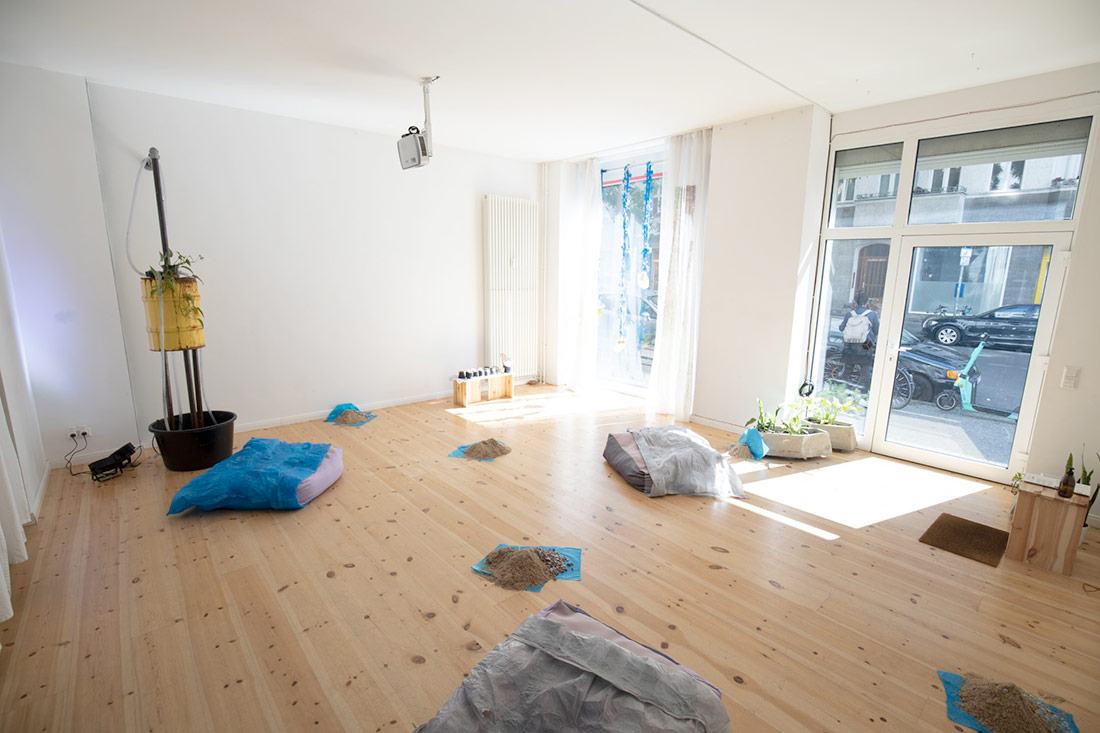
An exhibition view of “Conspiring Timelines, Shimmering Temporalities” is shown inside the exhibition space, TIER (Berlín). Across the warm wooden floor are pillows covered in fused plastic pillowcases, piles of marbles and sand and a projection of a video showing elderflower leaves being cut together and apart from trees.
For institutions to become anti-ableist, they need to interrupt their participation in furthering ableism in a holistic way by developing and holding themselves accountable to anti-ableist values and ethics. Working with practices of changing discriminatory communication habits, and questioning existing paradigms that privilege one moment as the most important, a framework coming from disability culture of “flexible performance” shifts away from these singular high-stress, high-intensity moments. In our exhibition “Conspiring Timelines: Shimmering Temporalities” at The Institute for Endotic Research in Berlin (2021), we worked with this framework to support multiple temporal needs offering open and closed groups and open and closed structures to allow for a multiplicity of ways of relating to time, programming and content access.
As a practice, anti-ableism is shifting the ways that structures, content and programming can be conceptualised, enacted and accessed. In this way, anti-ableism is just around the corner, taking shape against the structural and quotidian ableisms that surround us.
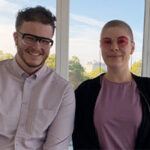
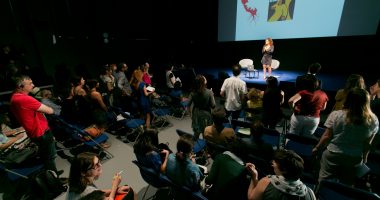

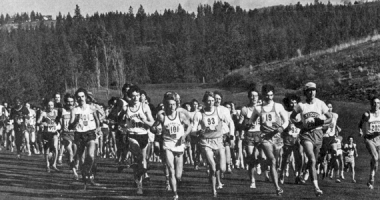

Leave a comment